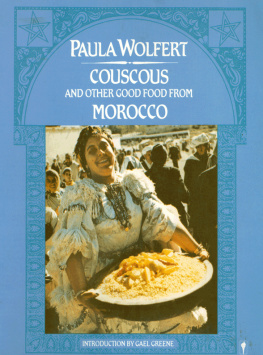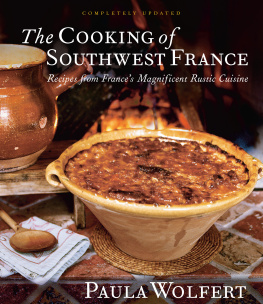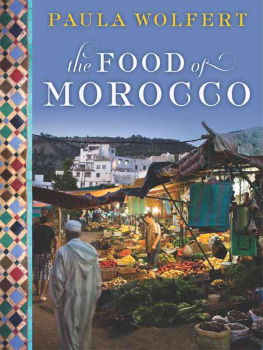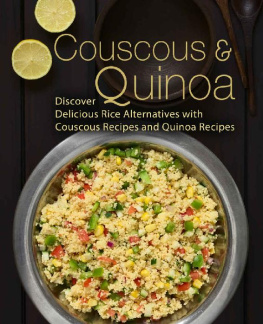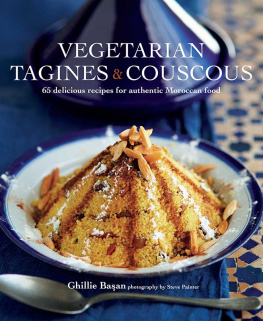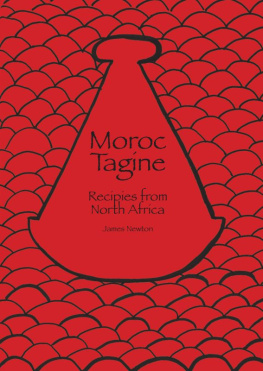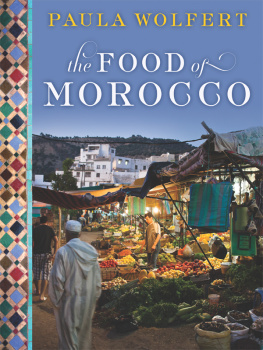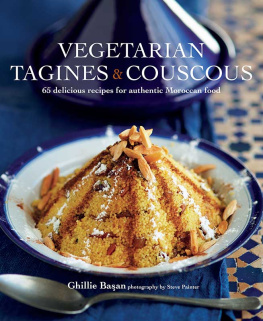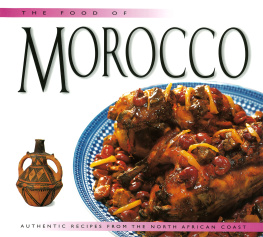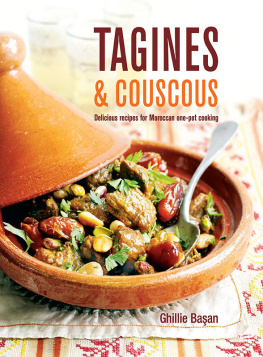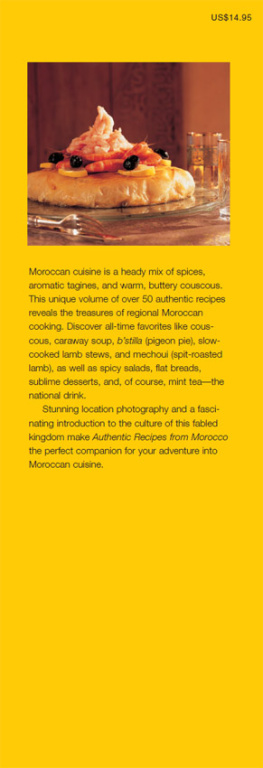
To Bill Bayer
Contents
DRAWINGS
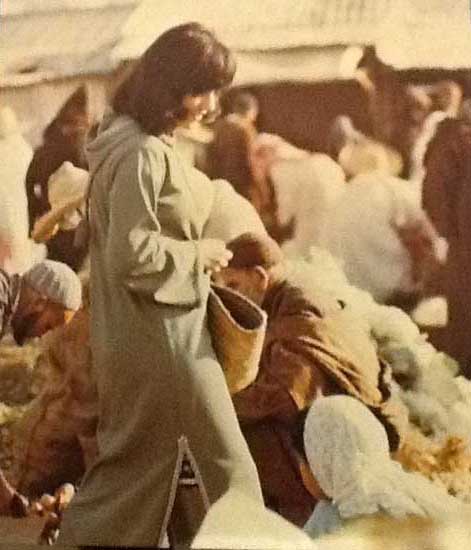
The Paula Wolfert I know is an adventuress, a sensualist, a perfectionist cook, a highwire kitchen improvisationalist. And this book is the story of her love affair with Morocco. Her passion is contagious. All the senses come alive, intoxicated by her evocations of cinnamon, garlic and mint... stirred by the promised taste of herb butter and saffron-sparked broth and by blurred fantasies of ritual Moorish feasts and the turmoil of the walled medina.
There are not too many otherwise sane and civilized humans capable of tears for a too salty green sauce, rage at a soggy noodle, ecstasy in a chocolate truffle. But Paula Wolfert is. And I am. We are soul sisters.
We met, of course... where else?... in Tangier. Two wandering American provincials meeting inevitably in the 007, pitch-dark, deserted discotheque on a narrow Moroccan street. We spoke only briefly. In those few minutes I learned we were both students of the late great kitchen genie, Dione Lucas. Paula had been Diones apprentice for a year and made the ultimate sacrifice... her gall bladder.
Two years later Paula Wolfert was in New York. One heard reports of her extraordinary couscous. And rumors about her Moroccan cookbook-in-work. We shopped together. Now... Paula Wolfert in action is not gentle. She moves through the greengrocers like an avenging demon. To Paula, an overage string bean is an outrage. A mushy tomato is a personal attack. The merchant of such shabby provisions gets withering scorn and muttered insults. Before her contempt, even tyrant greengrocers cringed.
I am invited to taste. Do I bring flowers? Wine? Bonbons? No, I bring cilantro (green coriander) because fresh cilantro is the badge of our friendship. (She cant buy it in her neighborhood. I can. A friend would not cross town without cilantro.) Paula opens the door, a chicken nestled in one hand. Toasting almonds perfume the air. The apartment is cluttered with the gleanings of her Moroccan adventures: rugs and hassocks and samovar and earthenware tagines. And books, a shelf of classics, five of gastronomic texts. The kitchen is tiny, cramped, a treasury of mysterious herbs and powders and lemons pickling in their brine. And there is Paula cursing her recalcitrant oven thermometer, ripping chickens apart with bare hands, smearing and sprinkling and jabbing... trying by sheer force of will to coax a cloak of egg to hug the back of a baked bird.
And now proud bird to table... or cumin-scented stew... or sweet and savory couscous. Fingers tear at the steaming limbs. Paula shows us how to roll fluffy broth-moist grains into crumbling spheres. One night it is an experimental bastela. The next, an exaltation of quince. One evening I arrived after dinner, too late for shad stuffed with almond paste. The leftover fish was sitting on the counter. I tasted. Oh almond-perfumed glory! I couldnt stop eating. Dont eat it, Paula cried. Its too rich. Stop.
I cant stop.
She smiled. You like it. And she grabbed the plate away. I hated her. But an almond-paste crisis had been averted.
Good Food from Morocco says the title of this book, pointedly. Paula flatly refused to succumb to the fetish for quantity. She would not include a recipe unless she loved it. She would watch our faces as we ate. What do you think?
Good, I would venture.
She would taste. Ecchh. Dont eat it. Its terrible.
No really, Paula, its quite edible. Its just... not great. But she would snatch the offending viand away and toss it into the garbage, leaving us to chew hungrily on our anise-scented bread.
What did you do wrong, Paula? asked Bill, her champion-hero-protector-writer-companion, one evening as we tasted a rather bland vegetable stew.
Nothing, she said. I did everything right. The dish tastes exactly the way it should. I dont like it. Im not going to put it in the book.
One day Paula telephoned in sheer euphoria. The most absolutely fantastic thing happened today, she began. Visions of great fortune tumbled through my head: legacies, lottery wins, emeralds, income tax refunds. I discovered today that spring-roll skins are positively related to warqa, Paula went on. Oh...
When the testing and winnowing and retesting were done, there was a wondrous and numbing feast. The ultimate bastela was so enchanting that when Paula started to remove it from the table, one guest simply would not permit it. If you touch that plate, Paula, she said, Ill bit your arm.
Well, Paula is back in Morocco now, terrorizing the merchants of the medina. It is great to watch her stomp through the market, a friend writes, looking neither to the left nor the right, ignoring the urgent pleas of mint merchants and lemon vendors as she makes her way to the very best bakoola and smen to be found. Not to mention listening to her prattle away in Arabic to her two astounded maids named Fatima while she literally throws meals together, waiting for the bread boy to come back from the village oven with the morning bread on a board held over his head.
This book vibrates with that same delicious loving madness. I doubt that anyone who adores good food will be able to resist the books siren call to Morocco. So one day you will be wandering through the food stalls of Tangiers medina maze. You may see a tall intense brunette pinching the quinces and poking the shad, sniffing smen, sneering at a battered peach or beaming over a plump squawking chicken. Thats Paula. Get her to take you home for lunch.
GAEL GREENE
Concerning the spices of Arabia let
no more be said. The whole country
is scented with them, and exhales an
odor marvellously sweet.
Herodotus
The moment the Yugoslav freighter touched at Casablanca in 1959 I boarded a bus and rushed to Marrakesh, in search of the adventurous and exotic life. I felt immediately that I belonged in this country, and have never gotten over that feelingI am still enchanted by all things Moroccan.
I lived in Morocco two years, then went on to Paris, where I spent eight years plotting ways to return.
Morocco is the only place I know where there is nothing that I do not love: the music, the great Berber city of Marrakesh, the long sandy coast, Tangier. I love the oases of the pre-Sahara, Fez in the early morning, the souks of the bled (countryside), the landscape that changes every hundred kilometers, and the Moroccans themselves, whose simplicity and hospitality always touch me and fill me, whenever I am away from them, with nostalgia and a deep longing to return.
And then, too, I love the food. For me it is one of the worlds great cuisines, but one that is, unfortunately, hardly known outside North Africa. Even in Paris, what passes for Moroccan food is very disappointing. For these reasons I finally decided, after years of cooking Moroccan dishes, to write a cookbook and reveal all I knew.
But as I began to work, I realized how little that wasthere were so many mysteries, so many variations, so many good cooks I could never meet. Soon I changed my mind about writing a definitive workthat seemed an absurd and pretentious task for a foreignerand, besides, I knew it would take a lifetime to complete.
So this book is not a comprehensive study of Moroccan cookery: rather it is about the good food of Morocco, the Moroccan food I like the best. My criteria for including recipes changed, too: it was no longer a question of finding a recipe for every Moroccan dish, but of finding or developing a good recipe for every dish that I felt tasted good.
Next page
